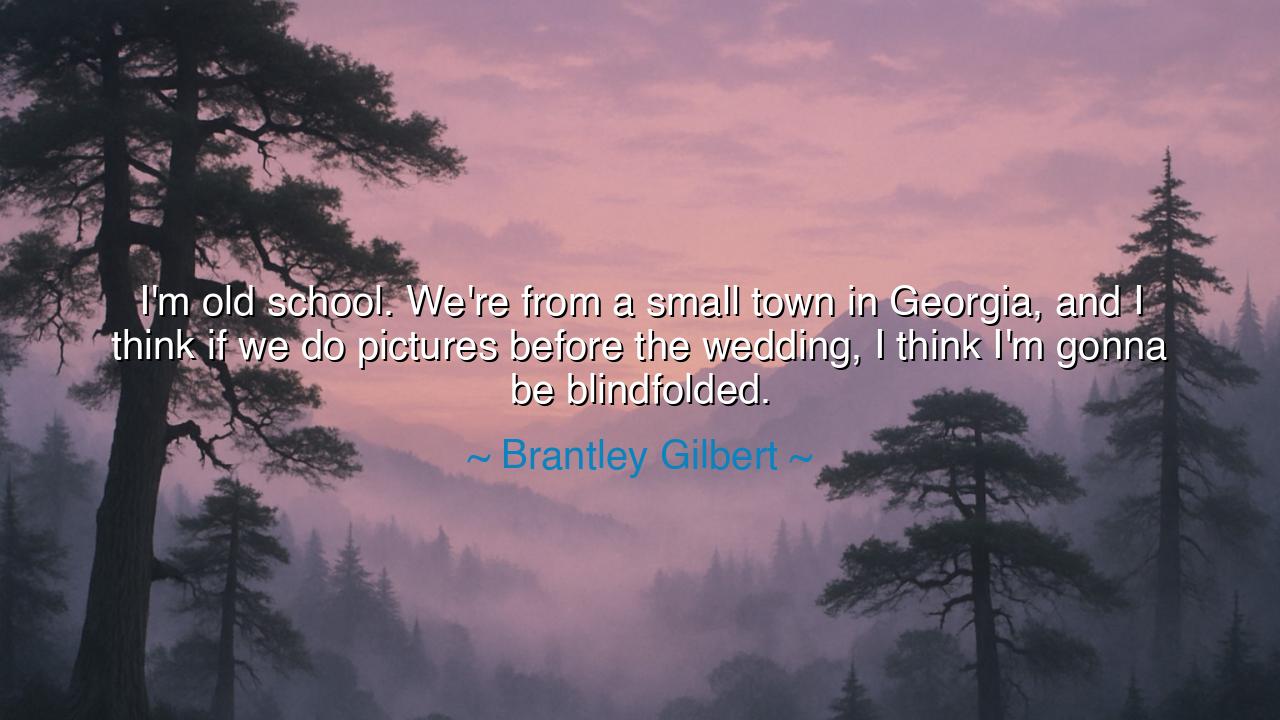
I'm old school. We're from a small town in Georgia, and I think
I'm old school. We're from a small town in Georgia, and I think if we do pictures before the wedding, I think I'm gonna be blindfolded.






In this saying, Brantley Gilbert speaks of tradition, reverence, and the deep-rooted customs of love. When he declares, “I’m old school,” he calls upon the ways of his ancestors and the sacred patterns passed down through generations. Coming from a small town in Georgia, his words reflect a community where weddings are not merely celebrations, but sacred rites that bind families and history together. By choosing to be blindfolded before the ceremony, he seeks to honor the ancient belief that a groom should not behold his bride until the moment she walks down the aisle — a moment meant to shine with mystery and awe.
The tradition of not seeing the bride before the wedding stretches far into the past. In ancient cultures, marriages were often arranged, and families feared that if a groom saw his bride too soon, he might reconsider, threatening alliances between clans or kingdoms. Over time, this custom evolved into a symbol of anticipation and purity, preserving the magical unveiling of the bride as a once-in-a-lifetime revelation. Brantley’s choice to uphold this tradition shows his respect for the sanctity of the moment, even amidst the modern world where such practices are often cast aside.
The blindfold carries its own symbolic weight. It represents trust, for in willingly veiling his own sight, Brantley places faith in his beloved, his family, and the path that destiny has prepared. It is also a gesture of self-restraint, echoing the wisdom of warriors who trained themselves to wait for the right moment to strike. Just as a warrior resists impatience on the battlefield, a groom resists the urge to satisfy curiosity, holding his heart steady until the sacred moment of union.
History offers examples of this reverence for tradition. In medieval Europe, royal weddings were grand affairs, yet even kings were forbidden to see their brides before the ceremony. When Catherine of Aragon first met Prince Arthur of England, their meeting was carefully orchestrated to preserve the sense of destiny and divine blessing surrounding their marriage. These rituals were not mere formalities but powerful symbols, shaping the spiritual weight of the union itself.
Thus, Brantley’s words are more than personal preference — they are a call to honor heritage and to remember that even in an age of modernity, some traditions carry timeless wisdom. By entering the wedding moment with mystery and reverence, he preserves the magic of the day, ensuring that when his eyes finally fall upon his bride, it will be with a heart fully awakened. In this, he teaches future generations that while customs may evolve, the sacred essence of love and commitment remains eternal.






LNPhuong Linh Nguyen
It’s kind of charming that Brantley Gilbert is so grounded in the idea of an old-school, small-town wedding. The blindfold idea could make for an interesting tradition, adding suspense and keeping the first look genuine. But I'm curious how this would work with a more modern, organized wedding. Do you think younger couples would feel the same about preserving these elements of surprise? Or has the desire for a perfectly planned and documented wedding taken over the old-school charm?
NNNhi Nguyen
Brantley Gilbert's quote makes me think about how weddings have evolved over time. While some people are going all out with extravagant pre-wedding photoshoots, this approach brings it back to simpler roots. I imagine it’s a way to make the big reveal more meaningful, but I also wonder how many couples today would choose to go down this route. Does this tradition still hold the same significance in today's digital age, where everything is captured in real-time?
TDTran Thi Diu
Blindfolding before the wedding is definitely a bold choice, and it speaks volumes about wanting to preserve some of the mystery and magic of the day. But I can't help but wonder if it could also create unnecessary stress. What if something goes wrong during the photoshoot or the first look? Could it be awkward for the bride and groom to be kept in suspense for too long? I’d be curious to know how many people are actually comfortable with such a tradition today.
PNPhung Ngoc
I can totally relate to Brantley Gilbert's sentiment! It feels like weddings today are so planned out, with everything being posted on social media before the big day. The idea of keeping some things like the first look a surprise definitely speaks to a simpler, more intimate time. I think it's kind of refreshing that he's sticking with the 'old school' way. It would be fun to see how many couples today would still go for something like this.
TNTuyet Nhung
I think it's interesting that Brantley Gilbert prefers the old-school approach to weddings, where surprises and traditions still play a big role. The idea of being blindfolded before the ceremony sounds like it adds a sense of mystery and anticipation. But I wonder, with all the social media and pre-wedding photo shoots happening these days, can couples still keep that element of surprise? Or does the pressure to have everything documented take away from that excitement?